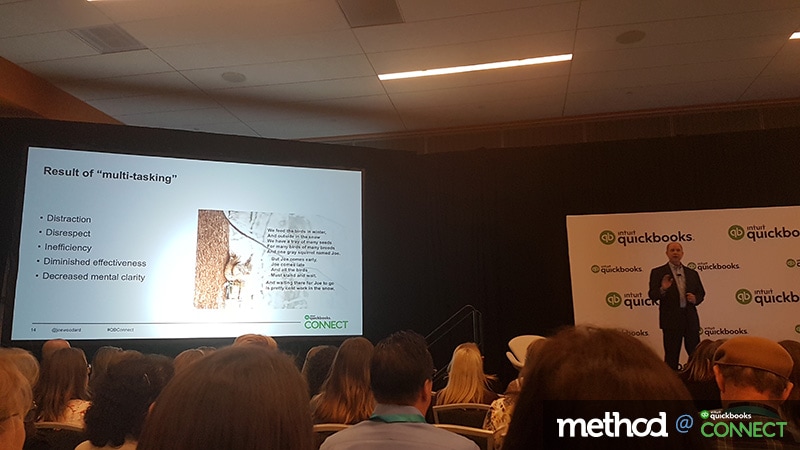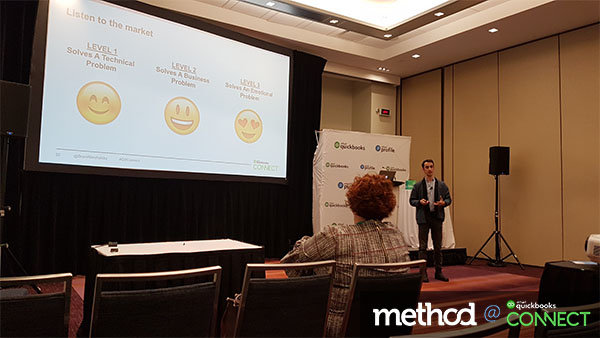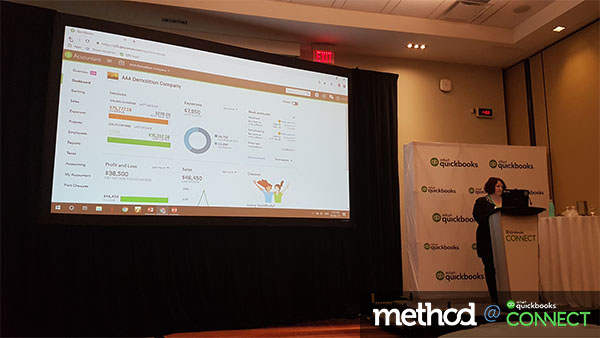Toward the end of a busy first day at QuickBooks Connect, a packed room eagerly awaited Joe Woodard’s talk on conquering task overload. Clearly, many of the accountants in attendance were looking for some guidance on working more productively.
“I’m hoping you’ll feel a little more empowered when we’re done with today’s session,” Woodard told the audience. As the CEO of Woodard Events, LLC, as well as a renowned author, consultant, business coach, and speaker, it’s safe to say he knows a thing or two about professional development in the accounting industry.
However, the audience wasn’t yet sure whether Woodard had all the answers they were looking for. When he promised to share his methods for getting to (and staying at) zero inbox, the room erupted in laughter — was such a thing even possible?
Overcoming productivity myths
Before getting to the secrets of an empty inbox, Woodard needed to debunk some common misconceptions about productivity.
The first myth is that you can manage time. In reality, no one has any control over time. Instead, productive people focus on managing projects and smaller tasks within those projects.
Woodard gave the example of someone trying to find the time to write a book. Such a large project can seem daunting, so just think of each individual page as a task to complete.
“If you want to write a book, you write a page and you write another page and you write another page — and all of life is that way.”
The second myth is that efficiency is the hallmark of productivity. Sure, someone who completes 80 tasks in a day will appear extremely productive. But what if those 80 tasks were unimportant or unnecessary?
Woodard explained that the true measurements of productivity are outputs, effectiveness, and mental clarity. Mental clarity is a big one for him: getting tasks out of his head by accomplishing them or depositing them elsewhere for future reference. He referenced David Allen’s Getting Things Done: “You should never think a thought twice unless you enjoy having that thought.”
The third productivity myth is that you can multitask. “You can only think about one thing at a time — that’s the truth,” said Woodard. Attempting to focus on two tasks at once inevitably leads to distraction and poor performance on one of them.
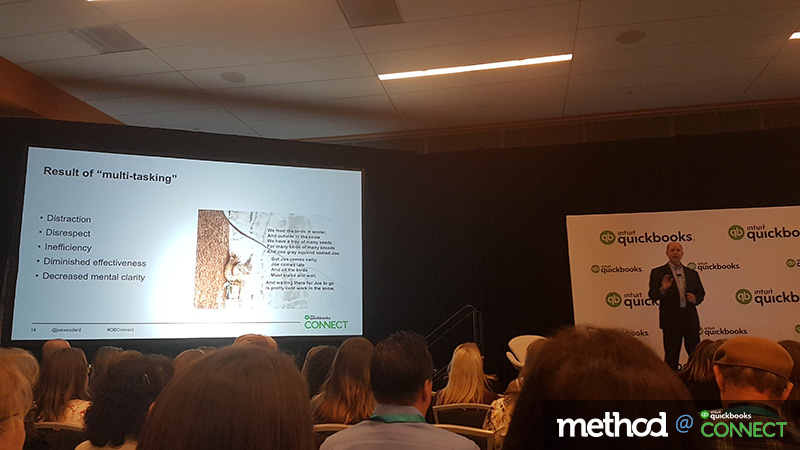
To drive the point home, Woodard asked the audience if they had ever attempted to interact with a teenager who’s on their phone: “You would think they just lost all of their mental capacity.”
Overcoming productivity roadblocks
Even when you know the truth about what productivity is (and isn’t), that doesn’t mean it’s easy to achieve it.
“In my experience, the psychological roadblocks are the biggest impediments to productivity — even more than process,” said Woodard. In other words, your mind is literally making it harder for you to get stuff done.
Negative thinking is one of the biggest barriers to working productively. Indeed, Woodard offered a laundry list of negative emotions that can hinder progress: fear, uncertainty, and doubt; worry, dread, and fretting about the future; anxiety, strife, and self-consciousness about the present; guilt, regret, and remorse about the past.
It’s enough to make you wonder how anyone gets out of bed in the morning. Luckily, Woodard reassured the audience that there are antidotes to all of these woes: things like planning, acceptance, forgiveness, and confidence.
And then there’s the procrastination beast. Procrastination causes you to prioritize the tasks that are easiest, most fun, or most predictable — meaning that by the time the post-lunch slump rolls around, you’ve run out simple tasks and can’t fathom tackling your most challenging tasks.
One of the best ways to overcome procrastination is to perform micro-tasks that can jumpstart the desire to do the larger task. It’s important to recognize that the desire to do something rarely proceeds doing it — “but if you continually act in a way and desire never follows, change occupations,” quipped Woodard.
Putting productivity in motion
Productivity begins with prioritizing your tasks appropriately. But first, make sure the tasks on your list deserve to be there.
Woodard told a story about being asked to come up with a mission statement and being reluctant to do so. But then he realized he was missing the intention of the exercise: “The point wasn’t to have a mission statement. The point was to have a mission.” If everything on your task list ties into your overall vision, mission, and purpose, it’s far easier to find focus.
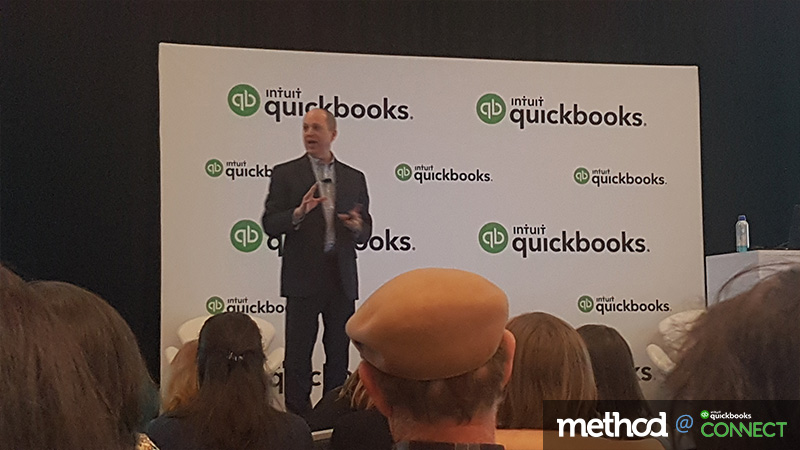
Woodard is a proponent for using the Eisenhower Matrix to set daily task-based goals. The idea is that each of your tasks falls into one of four quadrants in the matrix, and you need to incorporate each quadrant into each day.
- Tasks to manage: those that are both important and urgent.
- Tasks to focus on: those that are important, but not urgent. “The world of effectiveness lives in this quadrant,” explained Woodard.
- Tasks to avoid: those that are urgent, but not important.
- Tasks to limit: those that are neither urgent nor important.
You should also aim to complete your most challenging or dreaded tasks during the time when you are most focused and alert.
The elusive zero inbox
Finally, Woodard was ready to share his four-step plan for conquering your inbox, once and for all.
The first step is to adopt some kind of note solution — whether that’s Evernote, OneNote, or simple Word document. This note solution will become an extension of your brain; the place where you deposit important details so they aren’t cluttering up your mental space.
The second step is to go into your inbox and clear out all emails older than 60 days. Seriously, just delete them or move them into a folder. Realistically, said Woodard, if you have an email that’s older than 60 days, “there is nothing actionable in it that’s still actionable — or, if there is something actionable, someone else has pinged you about it since then.”
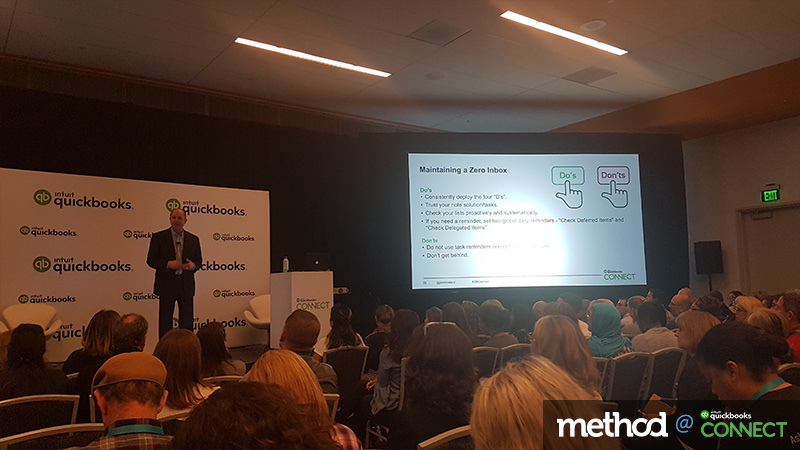
The third step is to go through your remaining messages and apply David Allen’s “four D’s”: delete it, delegate it, do it, or defer it (by adding it to your note solution). The point is to get every single email out of your inbox — and by extension, out of your brain. “This is fantastic airplane stuff,” Woodard suggested.
The fourth and final step turned out to be a bonus: experience clarity of mind. “I sleep well because I don’t have anything in my inbox,” said Woodard.
To close, Woodard reminded the audience that while zero inbox is not a myth, zero task list is. The point of life isn’t to have nothing to do — because how dull would that be? Instead, focus on organizing, prioritizing and executing your tasks wisely.
After all, nothing induces a good night’s sleep quite like a highly productive day.
Want more #QBConnect content? Check out our full coverage of QuickBooks Connect San Jose 2018!




